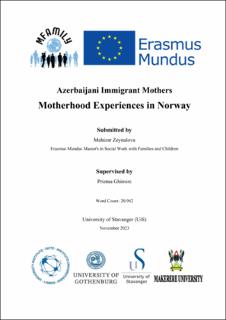| dc.description.abstract | The primary focus of this study was to examine the motherhood experiences of Azerbaijani
immigrant mothers in the Norwegian context. The main research question was how does it
differ from Azerbaijani ideals of motherhood versus Norway and what are the challenges they
face when navigating between these ideals and how do they navigate them? To explore that
the study employed a qualitative research design where a sample group of five Azerbaijani
mothers who had been residing in Norway for more than five years were included. Through a
snowball sampling strategy, the participants were recruited. A thematic analysis was used to
analyze and present the findings of this research.
The research findings showed that Azerbaijani mothers face significant cultural challenges in
their motherhood experiences when living in Norway. These challenges result from the clash
between their home culture and the host country's culture. Motherhood is seen as a carefully
planned and lifelong endeavor, with mothers aiming to contribute to society by raising
children as good human beings. Mothers adapt by embracing favorable aspects of the host
culture while discarding unfavorable ones. However, this adaptation leads to conflicts in
values between mothers and their children, as they are influenced differently. In this study, I
also found that gender roles within the immigrant family shift in the new environment, with
fathers becoming more involved in parenting. Despite these changes, mothers face challenges
in balancing work and family duties due to the enduring influence of traditional gender roles
from their home country. Moreover, the absence of support from relatives in the new country
can cause stress and isolation. To address these differences, mothers employ various
strategies, including engaging in different activities, communicating with people, and
integrating positive aspects from both cultures into their lives. Based on these major
conclusions drawn from the findings, appropriate policy and practice
recommendations, and recommendations in relation to possible further research, are made.
Key words: Immigration and Motherhood, Cultural Clashes, Feminism, Acculturation, New
Gender Role, Isolation and Adaptation. | |
